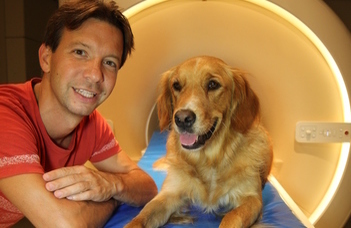ELTE researcher wins the most prestigious grant in Europe

The European Research Council (ERC) Starting Grant is awarded to young researchers who have already demonstrated an outstanding performance in their field and thus foster their research activities over a period of five years. This year, Attila Andics, the supervisor of the MTA-ELTE Lendület (Momentum) Neuroethology of Communication Research Group at the ELTE Department of Ethology of the Institute of Biology, was the only applicant from Hungary to win the grant. His project was awarded a funding of EUR 1.9 million. In the coming five years, he will explore the mental background to voice and speech perception in different species of mammals employing novel cognitive neuroscientific and ethological methods. Never before has such a complex comparative approach been applied in investigations exploring the evolutionary and cultural elements of voice perception skills.

The research method of Canine–Human Comparative Functional Magnetic Resonance Imaging (fMRI) involves carrying out the same tests on dogs trained to hold still for 6–8 minutes and on humans, which is unique in the world.
The aim of the research project entitled Voice and speech perception across mammals: a comparative study of humans, dogs and pigs (VOIMA), starting in 2021, is to establish whether the brain specializations for speech perception are human-unique or they developed due to the emergence and spread of speech adapting already existing mental processes to a new purpose.
The presumption is that if an adaptation took place, similar brain specializations helping the perception of human voice and speech may have developed in species in the environment of which human speech also emerged and became important. These species include, for example, the dog, which is the oldest domesticated mammal, as well as the minipig that has recently become popular as a companion animal. The VOIMA project uses comparative ethological and brain imaging methods to study the voice and speech perception of these two phylogenetically distant species commonly known to vocalize.
The research project is carried out at the ELTE Department of Ethology under the supervision of Ádám Miklósi. Researchers at ELTE and MTA have been studying the cognitive abilities of family dogs for more than twenty years, mainly in respect of their interactions with humans. Attila Andics, the leader of the research group, has been exploring the brain mechanisms of voice perception since 2004 and has contributed significantly to developing the canine–human comparative functional magnetic resonance imaging (fMRI) research method.

MTA-ELTE Lendület (Momentum) Neuroethology of Communication Research Group
The ERC Starting Grant promotes the work of young researchers holding PhD degrees. The winners of the grant can set up an independent research team with a five-year research plan. Previous winners of the grant from ELTE include Enikő Kubinyi, senior research fellow at the Department of Ethology, Bence Kocsis, assistant professor at the Department of Atomic Physics, Gergely Szöllősi, senior research fellow at the Department of Biological Physics, as well as Edit Mátyus, assistant professor at the Department of Physical Chemistry.
